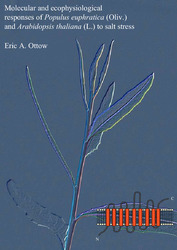| Areas | |
|---|---|
| Serie de libros (97) |
1383
|
| Nachhaltigkeit |
3
|
| Gesundheitswesen |
1
|
| Letra |
2379
|
| Ciencias Naturales |
5409
|
| Matemática | 228 |
| Informática | 320 |
| Física | 980 |
| Química | 1365 |
| Geociencias | 131 |
| Medicina humana | 243 |
| Estomatología | 10 |
| Veterinaria | 108 |
| Farmacia | 147 |
| Biología | 835 |
| Bioquímica, biología molecular, tecnología genética | 121 |
| Biofísica | 25 |
| Nutrición | 45 |
| Agricultura | 1005 |
| Silvicultura | 201 |
| Horticultura | 20 |
| Ecología y conservación de la tierra | 148 |
| Ciencias Ingeniería |
1799
|
| General |
97
|
|
Leitlinien Unfallchirurgie
5. Auflage bestellen |
|
Erweiterte Suche
Molecular and ecophysiological responses of Populus euphratica (Oliv.) and Arabidopsis thaliana (L.) to salt stress (Tienda española)
Eric Aart Ottow (Autor)Previo
Indice, Datei (64 KB)
Lectura de prueba, Datei (85 KB)
Populus euphratica (Oliv.) is capable of growth in saline environments. However, little is known on the molecular and ecophysiological traits of its salt resistance. The aim of the present investigation was to gain new insights into the strategies of P. euphratica to cope with elevated NaCl concentrations. Laboratory experiments with young P. euphratica plants revealed that Na + was primarily accumulated in leaves and roots while the stems were less affected. Severe salt stress caused a complete die-back of the salt-sensitive poplar hybrid Populus x canescens but did not injure P. euphratica despite accumulation of nearly 4% Na + in its leaves. X-ray microanalyses showed that apoplastic rather than vacuolar salt accumulation was the primary strategy to protect the cytosol against Na + toxicity. The ability to cope with salinity was also associated with the maintenance of cytosolic K + concentrations. Salt exposure induced development of leaf succulence due to an increase in cell number and cell volume, thus contributing to Na + resistance by dilution the salt concentration.
| ISBN-10 (Impresion) | 3865373798 |
| ISBN-13 (Impresion) | 9783865373793 |
| ISBN-13 (E-Book) | 9783736913790 |
| Idioma | Alemán |
| Numero de paginas | 156 |
| Edicion | 1 |
| Volumen | 0 |
| Lugar de publicacion | Göttingen |
| Lugar de la disertacion | Göttingen |
| Fecha de publicacion | 06.03.2005 |
| Clasificacion simple | Tesis doctoral |
| Area |
Biología
Silvicultura |








